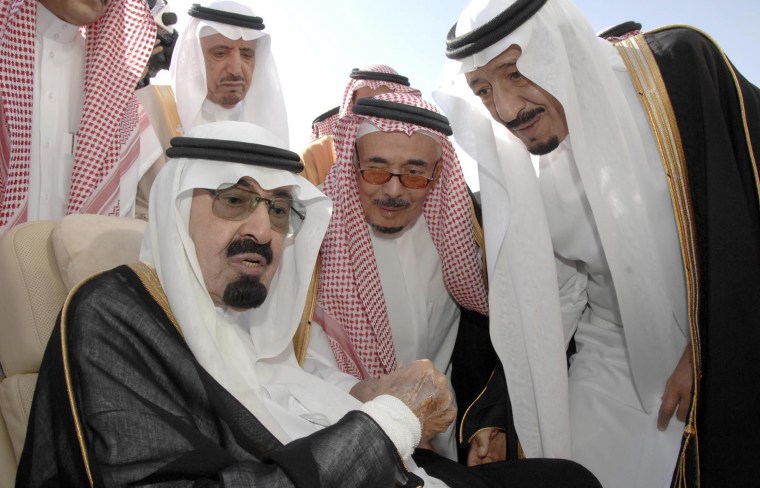Saudi Arabia’s King Abdullah has died, state television announced early Friday. He was 90.
King Abdullah’s successor, half-brother Deputy Prime Minister Salman bin Abdul-Aziz, became king immediately after his death, state television reported.
"His Highness Salman bin Abdul-Aziz Al Saud and all members of the family and the nation mourn the Custodian of the Two Holy Mosques King Abdullah bin Abdul-Aziz, who passed away at exactly 1 a.m. this morning (5 p.m. Thursday ET),” state television said in a statement attributed to Salman.
Abdullah, who took power in 2005 after the death of his brother King Fahd, was admitted to the hospital on Dec. 31, state media reported at the time. All channels of Saudi TV early Friday local time began broadcasting recitations of the Quran.
"The world has lost a revered leader"
State television said King Abdullah died of pneumonia. The king was hospitalized on Dec. 31, state television said at the time.
President Barack Obama called King Abdullah a leader who was a strong advocate for peace in the Middle East, and a reformer who pushed his country to greater engagement with the world. “I always valued King Abdullah's perspective and appreciated our genuine and warm friendship,” Obama said in a statement.
"As a leader, he was always candid and had the courage of his convictions. One of those convictions was his steadfast and passionate belief in the importance of the U.S.-Saudi relationship as a force for stability and security in the Middle East and beyond. The closeness and strength of the partnership between our two countries is part of King Abdullah's legacy," Obama said in a statement.
Secretary of State John Kerry said, "The United States has lost a friend, and the Kingdom of Saudi Arabia, the Middle East, and the world has lost a revered leader." He called King Abdullah "a man of wisdom and vision."
King Abdullah's body will be washed, as is the Islamic tradition, and taken to the main mosque in Riyadh, the Imam Turki bin Abdullah Mosque. Funeral prayers will be held at that mosque and mosques throughout the country. The body will then taken to the Al Oud cemetery in Riyadh for burial at 3:15 p.m. Friday local time (7:15 a.m. ET).

Salman, 79, is widely thought to be in bad health — a claim royal officials emphatically deny. Prince Muqrin bin Abdul-Aziz, who is also King Abdullah's half-brother and is a former head of Saudi intelligence services, was named crown prince.
Former President George H.W. Bush called King Abdullah as a "wise and reliable ally," recalling the countries’ alliance in the Gulf War after Iraq invaded Kuwait in 1990. "Of course, following the invasion of Kuwait, I will never forget the way Saudi Arabia and the United States stood together against a common foe — marking a moment of unparalleled cooperation between two great nations," Bush said in a statement.
U.S. Sen. John McCain praised King Abdullah as a reformer.
"King Abdullah was an important voice for reform in Saudi Arabia," McCain said in a statement. "He pushed for the modernization of the education system, curbed the authority of the religious police, and extended women the right to vote and run in municipal elections. He was also a vocal advocate for peace, speaking out against violence in the Middle East and standing as a critical partner in the war on terror."
Experts have told NBC News that Saudi Arabia faces enormous challenges in the region still feeling the aftershocks of the Arab Spring. It also faces challenges trying to stop the allure of radical militant Islamist groups like ISIS among its population.
Saudi Arabia, a key U.S. ally in the region, is one of the Middle Eastern countries who have joined a U.S.-led coalition conducting airstrikes on the ISIS. The country has also agreed to host American training of the so-called moderate Syrian rebels, the key to the U.S. strategy for fighting ISIS.
The new ruler is expected to fund the country’s extremely conservative Wahhabi religious establishment in an effort to thwart the lure of militant Islamists like ISIS, which has seized large parts of Iraq and Syria, Jim Phillips, senior research fellow for Middle Eastern affairs at conservative think tank the Heritage Foundation, told NBC News this week.
“I think the older generation in Saudi Arabia has to be acutely aware that the basis of their legitimacy is increasingly being challenged by radical Islamist militants and they must take action to drain away the support for those movements," Phillips said.
Abdullah had more than 30 children from around a dozen wives.
Reuters and The Associated Press contributed to this report.